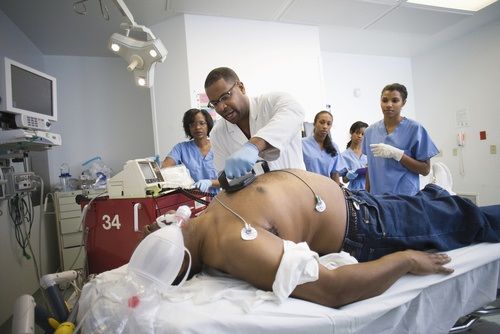Cardiac Arrest: Time to Abandon Intubation?
Endotracheal intubation may do more harm than good.

Emergency intubation of cardiac arrest patients is a standard part of cardiopulmonary resuscitation.
A new study questions whether such efforts have a proven benefit when these cardiac events happen in a hospital.
Writing in the Journal of the American Medical Association, Lars Anderson, MD, MPH, PhD, of the Research Center for Emergency Medicine in Aarhus, Denmark, and colleagues compared results in patients who were intubated within 15 minutes and a comparable group of patients who were not. There were more than 86,000 patients’ cases analyzed. All patients had suffered an in-hospital cardiac arrest and had an unshockable heart rhythm. Case data were taken from the Get with The Guidelines Resuscitation registry a US-based multicenter registry. The data excluded patients who arrived at the hospital intubated.
“Survival was lower among patients who were intubated compared to those not intubated, “the researchers found. Among the intubate patients, 16.3% survived to hospital discharge compared to 19.4% of patients who were not intubated.
Additionally, among those who survived, the patients who were intubated had a lower chance of have a good functional outcome.
“Although the study design does not eliminate the potential for confounding by indication, these findings do not support early tracheal intubation for adult in-hospital cardiac arrest,” they concluded.
The authors offered several potential explanations for their findings.
Intubation might lead to a pronged interruption in chest compressions, it could lead to hyperventilation and hyperoxia, or intubation cold delay other treatments such as defibrillation or giving a patient epinephrine.
Other possibilities are that the intubation could be unsuccessful initially resulting in a delay to getting adequate ventilation. Intubation also carries a risk of injuring patients.
Commenting on the study in an accompanying editorial, Derek Angus, MD, MPH noted that hospitals often spend a lot of money staffing their facilities with teams trained in Advanced Cardiac Life Support, including intubation.
The problem with determining whether this is a good policy is that the studies that show intubated patients have somewhat worse outcomes is that these patients are often far sicker in the first place.
Summarizing the findings, Angus wrote, “In other words, intubation may or may not be harmful, although clear demonstration of benefit is lacking. This is hardly a ringing endorsement for such an established intervention that requires substantial cost to provide, considering both the training and staffing costs and the downstream costs of mechanical ventilation and intensive care that are incurred once the patient is intubated.”
The best way to find out, he suggested, is to continue to look at even larger data sets—given that it would be ethically difficult to have a randomized controlled trial in which intubation would be withheld.
The article is entitled "Association Between Tracheal Intubation During Adult In-Hospital Cardiac Arrest and Survival."